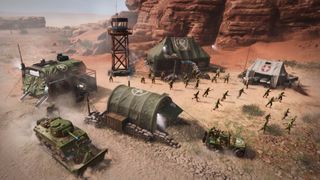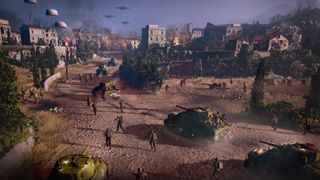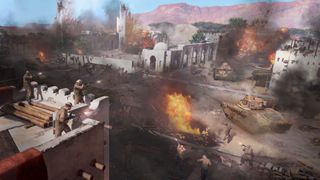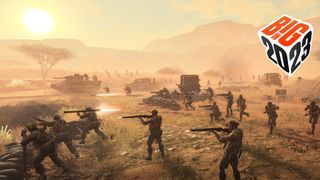Company of Heroes 3 has a time machine. Figuratively, of course, given the fact it's an RTS set in the Mediterranean during WW2. But after playing 45 minutes of its single-player campaign, I was transported back to my formative years in front of my dad's Windows 95-powered PC. Like many folks who grew up playing video games in the 1990s, I discovered war-torn real-time strategy through one of the best strategy games of all-time Westwood Studios' Command & Conquer in 1995, and had my interest in the subgenre solidified by that game's ultra-cool sequel, Red Alert, the following year.
Company of Heroes breathed new life into the well-established and somewhat waning military RTS scene in 2006, before Company of Heroes 2 breached the scene in 2013. With an ardent desire to satisfy strategists who enjoy competitive multiplayer and single-player campaigns alike, Company of Heroes 3 revives the series almost a decade on, and is likewise its most ambitious undertaking to date – helping propel it to one of our most anticipated new games for 2023.
How does developer Relic Entertainment plan to succeed? By leaning heavily on early feedback delivered by a pre-established council of modders, and competitive and casual players. "The idea of co-development with players, I think that's now an essential initiative in everything Relic does as a company moving forward," says Sachin Ryan, the lead single-player designer for Company of Heroes 3. "Developing video games in silo is something we've recognized does not work for us, so co-development has been hugely important to Company of Heroes 3."
Teamwork makes the dream work


Big in 2023 is the GamesRadar+ guide to the most anticipated games of the year. Join us all throughout January as we explore the biggest upcoming video games of 2023, and the developers making them.
Despite spending so little time with Company of Heroes 3, it's clear to me that its attempt to capture the buzz of classic single-player RTS fare is indeed working as planned. In motion, after crawling up the Italian coast and offing a handful of German-occupied bases, I reached an airfield that was identified as one of two points of interest my squad should overturn in order to turn the screw on the Nazis. On paper, our task was pretty straightforward: head north, then northwest to locate two communication towers, reclaim 'em, and fight and kill any advancing enemy soldiers in the process.
On the ground, it didn't quite go to plan. During my first attempt, I sent my defensive unit into a derelict building, only for the enemy's air support to blow it smithereens seconds later. On my second, I sent my best shooters into the same spot, before an enemy sniper picked them off one-by-one from an adjacent vantage point. On my, I want to say fifth, but it might have been sixth or seventh, attempt, I got the drop on the foe's mortar squad with some surface-to-air missiles of my own… before, you know, two tanks then got the drop on me and, quite literally, painted the town red. Eventually, lasting long enough to activate reinforcements in the way of my own tanks proved fruitful, but I'm replaying how the war might have gone in my head had I instead tried X or Y or Z without sacrificing so many of my comrades in one fell swoop.

Like old school Company of Heroes – and the military RTS hits it drew inspiration from before it – each failed mission fuels a desire to start again, and again and again. Creeping ever-closer to your goal is a great feeling, and every death feels like your fault and never an arbitrary punishment on the game's part. It's an intoxicating mix, and it's something Relic has spent a long time refining. Compared to the original game – which received multiple Game of the Year accolades in 2006 – Company of Heroes 2 didn't quite hit the same heights, despite being supported years into the future with its Western Front Armies and Ardennes Assault DLC packs. Ryan says it was during the latter end of this timeline that Relic and publisher Sega began looking at the series as a whole: where it had been and where it may go next.
"That process took a long time, and it wasn't just a direct path to where we are now," says Ryan. "We tried a number of things, and then we said: 'We know we want a strategy experience that's bigger, and it has a different style of strategy. Here we are now, it's been a long road, but I think everybody believes this was the right thing to do, to get the player council in place, and to make Company of Heroes more appealing to more potential players, but also just to offer more for players to stick with and to keep playing for longer and to stay engaged with."
People pleasing

The obvious complication of leaning heavily on players when sculpting the short and longer-term plans of game development, of course, is that you cannot please everyone. Video game players are passionate about what they like and do not like across the board, but strategy fans are among the most decisive and determined communities I've ever had the pleasure of chatting to and playing alongside. For the most part, this devotion comes from a place of love and respect, but nevertheless, it's impossible to satisfy the wants and needs of a community on a universal level.
"We have our community, it's very vocal, and we listen to the players that are out there," explains Company of Heroes 3 executive producer Steve Mele. "We have our internal community, the player council that we are working with closely, and we're bouncing ideas through them and constantly receiving feedback. When we make decisions, occasionally the odd one doesn't click; we take the data, we make a decision and we move forward. We are always trying to be informed in order to make decisions – and we're always talking to our community about priorities. When they prioritize a set of features, we listen to that priority list, and we have our influence there too."
"We have our community, it's very vocal, and we listen to the players that are out there"
Steve Mele, producer
"Through all of this, we can't exactly pull priorities from the bottom of the request list, but again, if you only take whatever's on top, you risk alienating and upsetting a different section of players. All of which is to say, it's a balancing act. We're doing our best and making decisions that we think will benefit the game, the players playing early builds at the moment, and the variety of players we hope to attract in the future."
I don't envy any front-facing developer determined to please as many current and prospective players as possible, while inevitably upsetting others. What Relic has built behind the scenes by way of a player council here is commendable, which is, in essence, a formalized take on putting its money where its mouth is. I've barely scratched the surface of what Company of Heroes 3 has to offer, but as someone who yearns for old school, single player RTS, I look forward to seeing it all come together this February.

Company of Heroes 3 is one of the most anticipated upcoming PC games of 2023, and it's set to launch on February 23. Relic Entertainment is also working on PS5 and Xbox Series X versions of the RTS, which are set to launch later this year.


